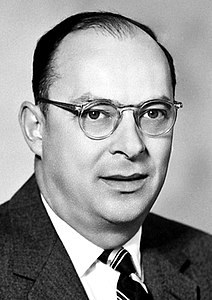
John Bardeen
Physicist, Academic
1908 – 1991
Who was John Bardeen?
John Bardeen was an American physicist and electrical engineer, the only person to have won the Nobel Prize in Physics twice: first in 1956 with William Shockley and Walter Brattain for the invention of the transistor; and again in 1972 with Leon N Cooper and John Robert Schrieffer for a fundamental theory of conventional superconductivity known as the BCS theory.
The transistor revolutionized the electronics industry, allowing the Information Age to occur, and made possible the development of almost every modern electronic device, from telephones to computers to missiles. Bardeen's developments in superconductivity, which won him his second Nobel, are used in Nuclear Magnetic Resonance Spectroscopy or its medical sub-tool magnetic resonance imaging.
In 1990, John Bardeen appeared on LIFE Magazine's list of "100 Most Influential Americans of the Century."
We need you!
Help us build the largest biographies collection on the web!
- Born
- May 23, 1908
Madison - Parents
- Children
- Nationality
- United States of America
- Profession
- Education
- Princeton University
- University of Wisconsin-Madison
- Bachelor of Science
- Employment
- University of Illinois at Urbana-Champaign
- University of Minnesota
- Lived in
- Madison
- United States of America
- Died
- Jan 30, 1991
Boston
Submitted
on July 23, 2013
Citation
Use the citation below to add to a bibliography:
Style:MLAChicagoAPA
"John Bardeen." Biographies.net. STANDS4 LLC, 2024. Web. 1 May 2024. <https://www.biographies.net/people/en/john_bardeen>.

Discuss this John Bardeen biography with the community:
Report Comment
We're doing our best to make sure our content is useful, accurate and safe.
If by any chance you spot an inappropriate comment while navigating through our website please use this form to let us know, and we'll take care of it shortly.
Attachment
You need to be logged in to favorite.
Log In